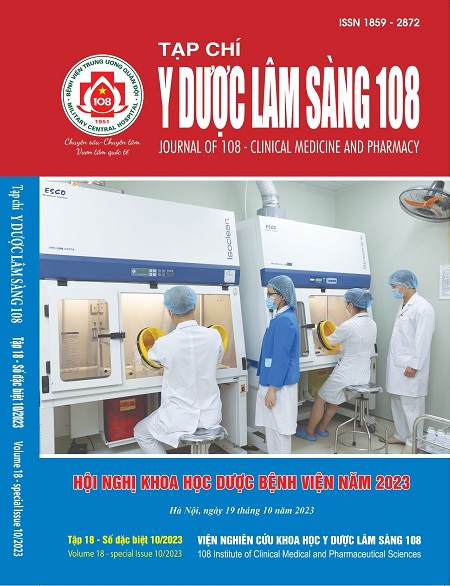Investigation of antibiotic use in neonatal sepsis at several hospitals in Vinh Phuc province
Main Article Content
Keywords
Abstract
Objective: To describe the current pattern of antibiotic use in neonatal sepsis at three hospitals in Vinh Phuc province. Subject and method: A retrospective study that was carried out on 478 medical records in 2021. Result and conclusion: There were 389 patients (81.6%) with a diagnosis of infection, including 352 with early-onset neonatal sepsis (73.6%) and 126 with late-onset neonatal sepsis (26.4%). The proportion of microbiological cultures was very low (6.7%), and these tests were mainly indicated at Vinh Phuc Obstetrics and Children's Hospital. Antimicrobial monotherapy was the most common regimen (65.5%) in both early- and late-onset neonatal sepsis (63.9% and 69.8%). Among them, ampicillin/sulbactam was the most frequent regimen used for both types of neonatal sepsis. In terms of antibiotic dosage, nearly half of the dosing regimens were inappropriate. Regarding ampicilin and sulbactam, only 21.5% of patients were prescribed an appropriate dose. The percentage of correct administration was about 50%, and the reasons for inappropriateness were inadequate volumes, shorter infusion times, and higher infusion rates than recommended. Therefore, it is necessary to develop local guidelines on the selection, dosage, and administration of antibiotics for early- and late-neonatal sepsis at the three studied hospitals. At the same time, in order to improve the quality of antibiotic use, microbiological testing should also be performed more regularly in neonates.
Article Details
References
2. Acquah SE, Quaye L, Sagoe K, Ziem JB, Bromberger PI, Amponsem AA, (2013) Susceptibility of bacterial etiological agents to commonly-used antimicrobial agents in children with sepsis at the Tamale Teaching Hospital. BMC Infect Dis 13: 89.
3. Andrew Powls (2020) Early onset sepsis in the neonate: Prevention and treatment. NHSGGC Paediatrics for Health Professionals.
4. Bielicki JA, Sharland M, Heath PT, Walker AS, Agarwal R, Turner P, Cromwell DA (2020) Evaluation of the coverage of 3 antibiotic regimens for neonatal sepsis in the hospital setting across asian countries. JAMA Netw Open 3(2): 1921124.
5. Kairamkonda V, Stachow L, Koo S (2019) Antibiotics for Neonatal Infection UHL Neonatal Guideline. NHS - University Hospitals of Leicester.
6. McKie J, Adrienne L, Browyn D., Maggie M, Kiran M (2015) Neonatal Unit Handbook. P14-24.
7. Northen Devon Healthcare, (2016), Sepsis Management Guidelines (early and late onset) for Neonates. NHS Trust: 1-9.
8. Pokhrel B, Koirala T, Shah G, Joshi S, Baral P (2018) Bacteriological profile and antibiotic susceptibility of neonatal sepsis in neonatal intensive care unit of a tertiary hospital in Nepal. BMC Pediatr 18(1): 208.
9. Royal Pharmaceutical Society (2022) National Formulary for Children - BNFC (2021-2022). 248-286
10. Uptodate 2022; Dose information for antibiotics. Available from: https://www.wolterskluwer.com/ en/solutions/lexicomp
 ISSN: 1859 - 2872
ISSN: 1859 - 2872
